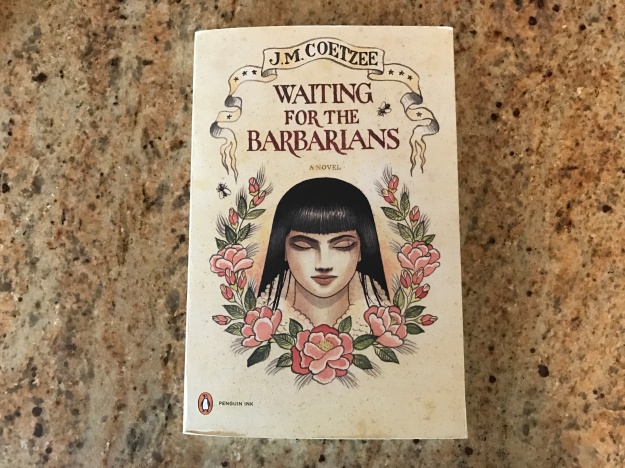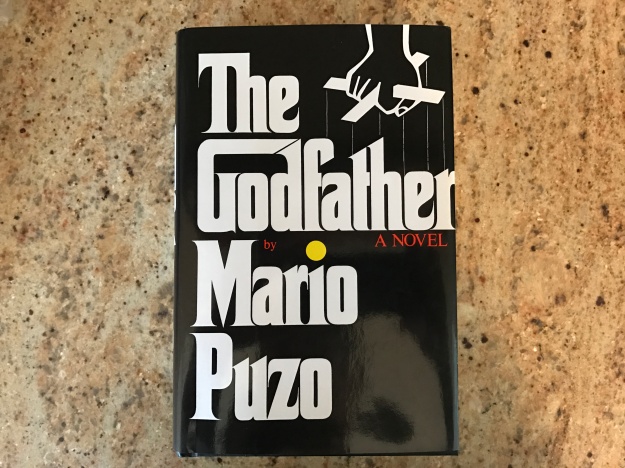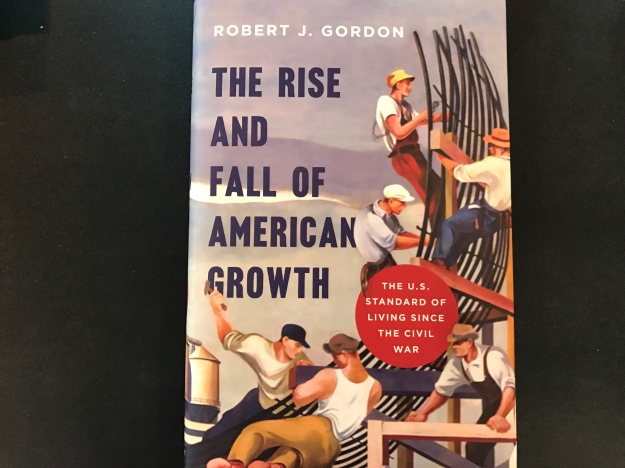Wow, who knew it would be so difficult to sit down and write a few words about the books I have read? I am trying to stick with it, though…
Here are the books I have read over the past couple months. No four-star ratings this time, but I am a harsh grader. Some very fun and interesting books, though!
Waiting for the Barbarians, by J. M. Coetzee
 Why I Picked Up This Book: I read an interview in The Atlantic with David Gelerntner, an unusual, very intelligent guy who has some views I agree with and some I don’t. Anyhow, he mentioned Coetzee, and that reminded me that I have wanted to read something of his. I have had good luck with Booker prize winners, and I had heard Coetzee’s name mentioned along with Salman Rushdie, Martin Amis, etc. I chose Waiting for the Barbarians because it had the best reviews on Amazon.
Why I Picked Up This Book: I read an interview in The Atlantic with David Gelerntner, an unusual, very intelligent guy who has some views I agree with and some I don’t. Anyhow, he mentioned Coetzee, and that reminded me that I have wanted to read something of his. I have had good luck with Booker prize winners, and I had heard Coetzee’s name mentioned along with Salman Rushdie, Martin Amis, etc. I chose Waiting for the Barbarians because it had the best reviews on Amazon.
One sentence describing what this book is about: The magistrate of a colonial frontier town responds to the real or possibly imagined conflict with the tribal Barbarians.
Ratings:
- Entertainment:


 At 150 pages, this was a pretty quick read. The character of the Magistrate and of his antagonists could easily be envisioned as corollaries to modern-day politicians and military men. The Magistrate was a man with a conscience, and it was interesting to see how determinedly he was willing to stand for what he believed in and against what he opposed.
At 150 pages, this was a pretty quick read. The character of the Magistrate and of his antagonists could easily be envisioned as corollaries to modern-day politicians and military men. The Magistrate was a man with a conscience, and it was interesting to see how determinedly he was willing to stand for what he believed in and against what he opposed. - Insight:

 Interesting portrayal of nonviolent resistance. I will also note here that I read like an engineer, taking things pretty literally. So I am sure that there are likely to be subtle insights that I missed!
Interesting portrayal of nonviolent resistance. I will also note here that I read like an engineer, taking things pretty literally. So I am sure that there are likely to be subtle insights that I missed! - Knowledge:
 I did not really gain any new knowledge from this book, nor did I expect to.
I did not really gain any new knowledge from this book, nor did I expect to.
Reminder: in a particular ratings category, four stars is mind-blowing, one star is meh, or in some cases NA. And I do not believe in grade inflation.
The Godfather, by Mario Puzo
 Why I Picked Up This Book: I recently read a book by Garry Kasparov where he described the Putin regime as operating essentially the same as the Corleone operation in The Godfather. I thought reading The Godfather might be fun, so I picked up a copy.
Why I Picked Up This Book: I recently read a book by Garry Kasparov where he described the Putin regime as operating essentially the same as the Corleone operation in The Godfather. I thought reading The Godfather might be fun, so I picked up a copy.
One sentence describing what this book is about: A young man enters the family business and discovers his true self.
Ratings:
- Entertainment:


 The Godfather is a very entertaining book to read; the type of book where one feels inclined to cruise through 150 pages or more in a single day. It is by no means a work of art; but it is not quite a “guilty pleasure” either. Somewhere in between. Since of course I have seen the movie, it was easy to visualize the story, as the movie sticks very close to the book.
The Godfather is a very entertaining book to read; the type of book where one feels inclined to cruise through 150 pages or more in a single day. It is by no means a work of art; but it is not quite a “guilty pleasure” either. Somewhere in between. Since of course I have seen the movie, it was easy to visualize the story, as the movie sticks very close to the book. - Insight:
 I did not get any significant insights from the book.
I did not get any significant insights from the book. - Knowledge:
 I did not really gain any new knowledge from this book, nor did I expect to.
I did not really gain any new knowledge from this book, nor did I expect to.
Reminder: in a particular ratings category, four stars is mind-blowing, one star is meh, or in some cases NA. And I do not believe in grade inflation.
Three Stones Make A Wall, by Eric H. Cline
 Why I Picked Up This Book: I saw a brief review of this book in the Wall Street Journal. Archaeology is a subject I know almost nothing about, but I have always found it somewhat awe-inspiring to view objects that were made thousands of years ago. It sounded interesting , so I picked up a copy.
Why I Picked Up This Book: I saw a brief review of this book in the Wall Street Journal. Archaeology is a subject I know almost nothing about, but I have always found it somewhat awe-inspiring to view objects that were made thousands of years ago. It sounded interesting , so I picked up a copy.
One sentence describing what this book is about: This book is a history of key archaeological sites and practices told by a leading professor of archaeology.
Ratings:
- Entertainment:


 This book presents fascinating stories about key archaeological sites such as Troy, Masada, Megiddo, Herculaneum, Mayan cities, and others – how the site was discovered, who discovered it, and how they explored it. It is written as a series of stories, and Cline’s style is conversational rather than academic.
This book presents fascinating stories about key archaeological sites such as Troy, Masada, Megiddo, Herculaneum, Mayan cities, and others – how the site was discovered, who discovered it, and how they explored it. It is written as a series of stories, and Cline’s style is conversational rather than academic. - Insight:

 Helped develop my sense growing sense of just how advanced the Ancients were politically and philosophically, and how fundamentally things have not changed all that much since ancient Greece.
Helped develop my sense growing sense of just how advanced the Ancients were politically and philosophically, and how fundamentally things have not changed all that much since ancient Greece. - Knowledge:


 I really gained a better understanding of early civilization and how it evolved, not to mention how ancient sites are discovered and investigated. Made me want to sign up for an archaeological dig!
I really gained a better understanding of early civilization and how it evolved, not to mention how ancient sites are discovered and investigated. Made me want to sign up for an archaeological dig!
Reminder: in a particular ratings category, four stars is mind-blowing, one star is meh, or in some cases NA. And I do not believe in grade inflation.
Anatomy of a Song, by Marc Myers

Why I Picked Up This Book: I saw a few excerpts in the paper, discussing how certain songs were conceived of, developed, and produced. They were interesting and fun to read, so I figured I’d get the book.
One sentence describing what this book is about: This book is an oral history of 45 iconic hits that changed rock, r&b, and pop (just like the cover says!).
Ratings:
- Entertainment:


 I find it really interesting to hear how these songs came about. It is always interesting to me to hear how serious many (not all) of these artists were in the pursuit of their craft. It was fun to read about the songs and then listen to them, hearing many of them in a new light.
I find it really interesting to hear how these songs came about. It is always interesting to me to hear how serious many (not all) of these artists were in the pursuit of their craft. It was fun to read about the songs and then listen to them, hearing many of them in a new light. - Insight:


 It is surprising to see how educated and serious all these artists were. It is really difficult to picture Jim Morrison discussing chord trasnsitions from A minor to B minor a la John Coltrane, for instance!
It is surprising to see how educated and serious all these artists were. It is really difficult to picture Jim Morrison discussing chord trasnsitions from A minor to B minor a la John Coltrane, for instance! - Knowledge:

 Interesting stuff to learn, but not really life changing!
Interesting stuff to learn, but not really life changing!
Reminder: in a particular ratings category, four stars is mind-blowing, one star is meh, or in some cases NA. And I do not believe in grade inflation.
How to Read and Why, by Harold Bloom
 Why I Picked Up This Book: I had seen a few interviews with Harold Bloom, and he seemed like a smart, interesting guy. I saw the title of the book, and was intrigued.
Why I Picked Up This Book: I had seen a few interviews with Harold Bloom, and he seemed like a smart, interesting guy. I saw the title of the book, and was intrigued.
One sentence describing what this book is about: An erudite professor of English discussed how and why to read his favorite plays, poems, and novels.
Ratings:
- Entertainment:
 Listening Bloom talk about English is like listening to Einstein talk about Physics. I forced myself, with difficulty, to finish this book.
Listening Bloom talk about English is like listening to Einstein talk about Physics. I forced myself, with difficulty, to finish this book. - Insight:

 The main insight I got from reading this book is that I made the right decision NOT to major in English
The main insight I got from reading this book is that I made the right decision NOT to major in English - Knowledge:
 When I selected this book I was hoping to learn how to read a book to gain more insight and understanding. I did not realize that what the title really meant was “how and why to read certain important works”.
When I selected this book I was hoping to learn how to read a book to gain more insight and understanding. I did not realize that what the title really meant was “how and why to read certain important works”.
Reminder: in a particular ratings category, four stars is mind-blowing, one star is meh, or in some cases NA. And I do not believe in grade inflation.
TIDES: The Science and Spirit of the Ocean, by Jonathan White

Why I Picked Up This Book: I saw an advertisement for this book in Wooden Boat magazine, and decided to check it out.
One sentence describing what this book is about: This book contains everything you could possibly wish to know about the tides, including the science, history, geography, spirit, and amazing facts, all told by a surfer dude science journalist.
Ratings:
- Entertainment:

 Some of the chapters were extremely interesting to read, though I think in many cases it would have helped to have more photos. However, at some points the scientific background and discussions got a bit tedious, tempting me to skip ahead.
Some of the chapters were extremely interesting to read, though I think in many cases it would have helped to have more photos. However, at some points the scientific background and discussions got a bit tedious, tempting me to skip ahead. - Insight:

 The effect of the tides on human thought and the emergence of society was pretty dramatic, and not something that I have thought much about. And in these days of rising sea levels, it certainly merits some serious thought!
The effect of the tides on human thought and the emergence of society was pretty dramatic, and not something that I have thought much about. And in these days of rising sea levels, it certainly merits some serious thought! - Knowledge:


 It was really cool to read about some of the amazing tides around the world – for instance, the tide that roars up a river in China as a 25 foot wall of water, or the tribe in Canada that climbs through the ice in the Hudson Bay to forage in the caverns left behind by the receding tide. I will never look at the beach in quite the same way.
It was really cool to read about some of the amazing tides around the world – for instance, the tide that roars up a river in China as a 25 foot wall of water, or the tribe in Canada that climbs through the ice in the Hudson Bay to forage in the caverns left behind by the receding tide. I will never look at the beach in quite the same way.
Reminder: in a particular ratings category, four stars is mind-blowing, one star is meh, or in some cases NA. And I do not believe in grade inflation.
INGREDIENT: Unveiling the Essential Elements of Food, by Ali Bouzari

Why I Picked Up This Book: Karen and I attended a lecture/demonstration by Ali Bouzari, and the lecture was sufficiently interesting (and the food sufficiently delicious) to cause me to purchase the book.
One sentence describing what this book is about: Useful, comprehensive facts and techniques regarding food chemistry, written for the non-scientist.
Ratings:
- Entertainment:

 As I enjoy food and cooking, I am quite happy to read books about food cover-to-cover. Even cookbooks! While this book contains no recipes, it has lots of useful information on how to take advantage of the interactions between water, sugars, lipids, minerals, etc.
As I enjoy food and cooking, I am quite happy to read books about food cover-to-cover. Even cookbooks! While this book contains no recipes, it has lots of useful information on how to take advantage of the interactions between water, sugars, lipids, minerals, etc. - Insight:


 Very thought-provoking. Makes it easy to understand why some recipes work and why some don’t. Will be very useful for troubleshooting things that don’t quite work out the way I planned.
Very thought-provoking. Makes it easy to understand why some recipes work and why some don’t. Will be very useful for troubleshooting things that don’t quite work out the way I planned. - Knowledge:


 Packed full of interesting and useful information regarding food interactions. It is scrupulously written without using scientific jargon of any kind – a bit excessively so in my opinion.
Packed full of interesting and useful information regarding food interactions. It is scrupulously written without using scientific jargon of any kind – a bit excessively so in my opinion.
Reminder: in a particular ratings category, four stars is mind-blowing, one star is meh, or in some cases NA. And I do not believe in grade inflation.




